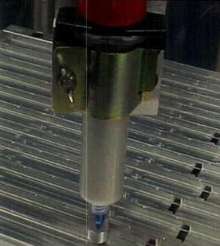Electrically-Conductive Ink bonds to variety of substrates.
Press Release Summary:

One-component, silver-filled, 40-3920 polymer system provides electrically conductive path and bonds to substrates such as kapton, mylar, glass, polyester, and ceramic. With viscosity of 9,000 cps at 25°C and operating temperature of -20 to +140°C, product is suited for EMI/RFI shielding, membrane switches, flexible circuits, and polymer thick film circuits.
Original Press Release:
40-3290 Electrically Conductive Flexible Ink
We are pleased to announce the development of the 40-3920 Electrically Conductive Flexible Ink.
40-3920 is a one component silver filled polymer system designed to provide an electrically conductive path. It's excellent conductivity and flexibility make it a suitable material for EMI/RFI shielding, membrane switches, flexible circuits, and polymer thick film circuits.
The 40-3920 Electrically Conductive Ink has wide appeal due to it's single component nature and ability to bond to various substrates. A case study involving the 40-3920 and a photograph are included for your consideration.
Small quantities of 40-3920 are available for evaluation.
DESCRIPTION:
40-3920 is a one component electrically conductive ink. 40-3920 is a silver filled polymer system which exhibits outstanding adhesion to a variety of substrates, such as kapton, mylar, glass, polyester, ceramic, etc. This thick film ink provides excellent conductivity for many electronic applications. It is screen printable and also sprayable.
APPLICATIONS:
o Membrane Switches
o Flexible Circuits
o Polymer Thick Film Circuits
o EMI/RFI Shielding
FEATURES:
o Flexible
o Low Electrical Resistance
o Low viscosity
o Excellent Adhesion
TYPICAL SPECIFICATIONS:
Color: Silver
Viscosity, 25°C, CPS: 9,00
Specific Gravity, 25°C: 2.2
Electrical Resistivity, Ohms/CM: .0002
Operating Temperature, °C: -20 to +140
Flash Point, °C°F: 99211




